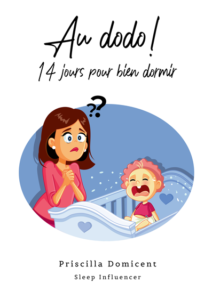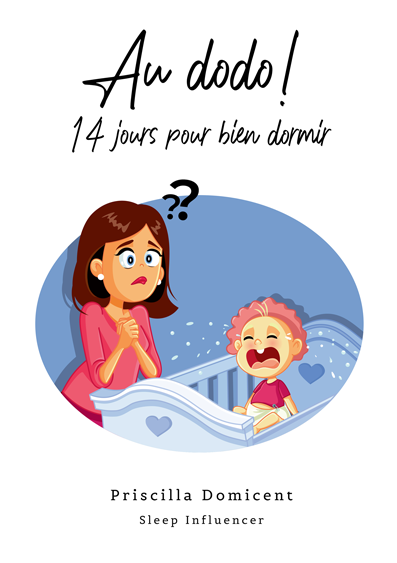4 months – 6 years
Sleep history analysis
Second consultation incl. a sleep assessment and a solution proposal
A personalized Sleep Project
Sleep log analysis
Plus
599 €4 months – 6 years
Sleep history analysis
Second consultation incl. a sleep assessment and a solution proposal
A personalized Sleep Project
Sleep log analysis
4 follow-up consultations
Premium
699 €4 months – 6 years
Sleep history analysis
Second consultation incl. a sleep assessment and a solution proposal
A personalized Sleep Project
Sleep log analysis
4 follow-up consultations
Unlimited consulting by e-mail or text message
A free consultation (20 minutes)
To help you in your quest for a good night’s sleep, I start by listening to your story. I want to understand how both parents feel, the challenges that you are facing, and if there are some overwhelming problems that we should take into account. During this consultation, we will also determine whether your child truly has a sleep issue which needs to be addressed now, later, or not at all. Finally, if my support is needed, we will discuss my level of involvement.
If you are a parent-to-be, I can only encourage you to become more familiar with your baby’s sleep. You will be better prepared and prevent the tsunami of fatigue that the vast majority of new parents go through.
The ultimate sleep guide for babies (0 – 3 months)
Congratulations on your baby! This is supposed to be one of the happiest moments in a person’s life. But in reality, new parents go through a crazy rollercoaster ride in the first few months. With around-the-clock feedings, the excessive crying, and on top limited sleep, you can easily get on the fast track to exhaustion.
In order to prevent you from experiencing the hectic pace of life and becoming a mere shadow of your former self, I strongly advise you to read the guide “Sleep! – Uncover the Secrets About Baby Sleep”. Establishing healthy sleep habits early on is a real health benefit to your newborn and the whole family. You will be able to enjoy the first moments of your new family life in serenity while your little one will benefit from an optimal sleep.
This guide addresses the following questions regarding a baby:
- How many hours should a newborn sleep?
- Why does she/he sleep so much during the day and seems to be more active at night?
- When does a baby sleep through the night?
- How can you calm a crying baby?
- How can you mimic the in-utero sensations?
- How to understand what a crying baby needs?
- How does sleep play a crucial role in a child’s development?
- How can you create a sleep-friendly environment for your baby?
- How to take all safety measures to avoid the sudden infant death syndrome?
- When and how could your baby learn positive sleep associations?
To help parents to safeguard their well-being, the following questions will be answered:
- How could you best avoid fatigue during the first few months?
- How to manage your new life if fatigue sets in?
- What’s the difference between baby blues and postpartum depression?
- How do you recover from postpartum depression?
– Coming soon –
A sleep history analysis
By filling in the questionnaire, you have the opportunity to provide essential information about your child’s sleeping habits, routines, temperament, and other factors that may affect his/her sleep. On this basis, I will conduct a thorough analysis and work towards the objectives.
A second consultation (90 minutes)
This conversation is an essential moment during the process. The result of my analysis is outlined to both parents. I will explain why and how certain factors disturb your little one’s sleep. A suggestion regarding optimal solutions will be made in order to achieve your objectives. If we agree on the approach, this will be included in your personalized Sleep Project. If required, the initial Sleep Project draft can be adapted based on your input. This session is also a great opportunity for real-time questions, exchange of ideas and information resulting in immediate feedback.
An in-home consultation is also possible upon request. The price varies according to your location. By welcoming me into your home, you give me the opportunity to become familiar with your environment. This way, you are sure to receive the best proposal for your child to achieve his/her optimal sleep potential.
A custom-made Sleep Project
Your Sleep Project will only be applicable to your family. Believe it or not, there is no one-size-fits-all solution since each person’s goals, lifestyle, and family dynamic are unique.
I adapt each and every Sleep Project to help you to make the best choice about your child’s sleep. You will be given detailed information to understand why your child experiences sleep troubles and how positive sleep-training techniques will improve the current situation.
Your Sleep Project will cover the following topics:
- Key sleep concepts to keep in mind and to put into practice during the whole sleep-training process.
- Analysis of your child’s daily schedule and routines to identify potential factors hindering his sleep (e.g. his medical condition, negative sleep associations, and the sleep environment).
- Solutions to coach your child to self-soothe.
- Easy-to-follow, step-by-step plan to assist your child at naptime and bedtime while limiting the crying episodes.
- A sample schedule adapted to your child’s age
- Additional information upon request (e.g. how to stop night feedings or how to make two kids sleep peacefully in one room).
A sleep log analysis
Keeping a sleep log is a great way to determine the average amount of hours your baby sleeps in a 24 hours’ window. Where does she/he prefer to sleep or what are their physical signs of fatigue? Thanks to your notes, we can find out what happens at bedtime and during the night and how your baby reacts while sleep-deprived. Keeping a written record instead of relying on vague memories blurred by fatigue, it makes easier to define your child’s natural rhythm. A sleep log should be kept for at least 15 days in order to clearly identify the pattern.
Telephone consultations (20 minutes each)
Moving from theory into practice can be challenging. Applying the recommended sleep-enhancing solutions can be more difficult than expected, especially in the middle of the night. To provide you with on-going support, I offer four follow-up consultations usually scheduled within the 2 weeks of the Mobilis. The purpose of these conversations is to discuss progress, evaluate the effectivity of suggested solutions, and clarify any doubts or questions.
Mini Package: You can book free telephone consultations on the day of your purchase and the date your child reaches the age of 4 months. Please be aware that every baby starts to sleep through the night based on his/her own natural rhythm. So, I cannot guarantee that your little one will be sleeping through the night before he/she turns 18 weeks old. During the first trimester, rather than discussing sleep-training techniques, I focus on positive practices to shape a newborn’s sleep.
Daily support
Thanks to a daily contact, I have to opportunity to remind you of the sleep principles and the Sleep Project’s pieces to be implemented on a specific day. With our daily rendezvous, you can take the opportunity to give me an update about the sleep progression or request adjustments if needed. You can contact me by e-mail or text message for unlimited times for two weeks, starting from the first day of the Mobilis. I will answer your messages within 24 hours, with some exceptions (e.g. holidays).
Dodo Workshops
Sleep is a learned skill that you can teach your child
As a parent, you want what is best for your child and this includes a healthy sleep hygiene. Sleep is one of the skills that you can teach your child.
While it’s true that sleep needs vary from one person to another; there are some very reasonable science-based guidelines to help you determine whether your child is getting the best sleep to grow, learn, and play.
During this workshop, we will address the following topics:
- Why is a healthy sleep habit essential for children?
- How does a child’s sleep differ from an adult’s sleep?
- When is a baby expected to start sleeping through the night?
- How can you calm a crying baby?
- What are the positive sleep associations you can introduce from early on?
- How could you identify sleep problems?
- How can you teach your child to fall asleep on his/her own?
- How does the parents’ behavior influence their child’s sleep?
The aim of this workshop is to provide you with simple tips to put into practice and get the whole family to enjoy a good’s night sleep.
Let me help you to make an informed decision about your child’s sleep.






